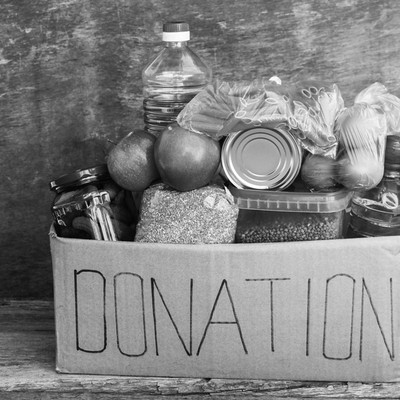
The Woman Aiming To Put An End To Hunger In The UK
The Trussell Trust supports a network of around 1,200 food banks across the UK. In my role as chief executive, it’s my job to support the team supporting those food banks.
That could involve forming relationships with supermarket partners, finding Covid-secure ways to deliver food to the banks, or simply supporting the area staff, who work with local communities, through the pandemic. We also do a lot of research and advocacy work – we analyse who exactly it is coming to food banks and the driving forces behind those trends, before engaging with the government on both a local and national level to talk about how things can – and must – change.
Even before the pandemic, there had been a huge surge in demand at food banks. Over the past five years, the number of food bank visitors has risen by 74%. So, before the recent health crisis even set in, we had started a lot of work to try and meet that demand. That said, the impact of coronavirus was instantaneous. During the first two weeks in March last year, we saw a 12% increase in visitors to our food banks year-on-year. By the last two weeks of that month, the increase was closer to 87%.
It showed us people were losing their jobs or contracts almost immediately – and that there was no safety net. Supermarkets also started struggling with food supply, and donations usually made in-store suffered as a result. There was a time in early April when we really wondered if our network would be able to carry on – especially as our volunteers tend to be older. Thankfully, the team – and those volunteers – decided it wasn’t acceptable to give up – we needed to support people more than ever.
The latest statistics tell a staggering story of what life has been like for some people in the past year. The most recent data covers the first six months of pandemic, and we’ve seen a 47% increase in need, overall. In the past year, we delivered 1.2m emergency food parcels – that equates to one every 13 seconds – with 2,600 of those parcels going to children every day. Families with children have accounted for two of out five households that have been forced to come to a food bank. It’s completely unacceptable. Hunger in our country is not about access to food, it’s about not having enough money. And that extends to being able to afford things like electricity, accommodation and essential clothing. Our food banks have done extraordinarily well to be a sticking plaster, but it’s not enough.
Marcus Rashford has done extraordinary work to galvanise support and highlight the issue. None of us think it’s right that children are going hungry in this country. What Marcus has done is cut through the noise, but there’s a bigger problem to tackle: how do we preserve dignity in our response? By that, I mean it’s great if we can support children through the school holidays, but the bigger issue is about parents not having enough money. The good news is, there are ways in which we can do that. We need to ensure that when people are unable to work (whether that be because they’re unwell, they lose their job, or they’re a full-time carer) they have enough money to cover the essentials.
During the pandemic, there have been different challenges at different stages. Initially it was supply of food and donations – now it’s the emotional toll on our volunteers. It’s been a really long year for them.
The demographics of who might visit a food bank is varied up and down the country. For instance, in the south east, it’s the cost of housing which people find so difficult to afford. But, ultimately, the thing all food bank visitors have in common is that their income is too low to cover the essentials – whether it’s because they work on zero-hours contracts or rely on benefits. On average, most visitors live on £50 a week, after rent. Over the past year, our visitors have mostly been families with multiple children, single parents, and there’s also been a high proportion of people with disabilities. With unemployment predicted to rise (until 2024 say the latest estimates) it’s likely we’ll see more people relying on the social security system to get by – which will mean more people from different backgrounds relying on food banks.
Our vision is to live in a UK which doesn’t need food banks. That’s why everything we try to talk to the government about has to be rooted in evidence – it’s one of our core principles. It’s about presenting them with quantitative data about why people are referred to our food banks and the emotional stories behind that, too. We then try to work with ministers and devolved governments by presenting suggestions for change. We work closely with leading anti-poverty charities too, to help make our case. We also try to get the information out to the general public to explain what the situation is. We know the public don’t think it’s right, and ultimately, governments respond to general consensus, not organisations. Change usually comes about due to the will of the people.
When we find partners on a national level, we can harness more support for local banks. We’re always looking for additional support, and supermarkets can help us with that. For example, Asda helped fund a report we did into hunger in the UK and what the drivers were, which helped us engage further with the government. It will take all sectors working together to eliminate poverty.
The prospect of welfare cuts is something that keeps me up at night. And right now, we have a live example: the government did the right thing to increase universal credit by £20 a week at the start of the pandemic. But that’s due to stop at the end of April. We just published a report with YouGov about how this will impact people – around a quarter of a million parents said they’d be worried about being able to provide food for their children, with another 1.2m saying they would be forced to visit a food bank. It makes me desperately worried.
There have been some really positive moves by government during this crisis. The job retention (furlough) scheme and Covid winter scheme are just two examples. But that level of support needs to carry on – we can’t go back to the situation where those on the lowest incomes bear the load. Thankfully, it’s my belief the conscious of the general public has changed during the crisis – particularly in terms of how we support each other. That ‘not on my watch’ approach needs to be carried forward.
At our food banks, we’re dependent on the generosity of the public. That’s both in terms of volunteering time to run our food banks and donations. People have stepped up, but we really need it to continue. If you would like to make a donation to your local food bank, you can go to our website to track down the one nearest to you and find out what they’re short on. It’ll also tell you where best to make your donation – whether it be at a supermarket or somewhere else.
Alternatively, people can get involved with our Hunger Free Future campaign. In the immediate future, we’re focused on saving the £20 uplift to Universal Credit. But it’s also about bringing as many people together as possible to fight poverty long-term. There are lots of ways to join the campaign: you can make a financial donation, take voluntary action, or just campaign on our behalf and spread the word. There’s lots of information online about how to make a difference and be part of the change.
If you’re not sure what to donate, there are things food banks always need more of. They include tinned meat, coffee and long-life milk, as well as feminine hygiene products and toiletries in general. The latter account for a huge – but often unknown – proportion of what we give out.
It is hard to remain hopeful for the future. The whole team lives every day with the conflicting paradox in their minds that providing support for people is crucial, but it’s not right that we have to. We’re always thinking about how we provide safe, welcoming spaces (especially during a pandemic), and give people some sense of dignity. It arguably feels like a hugely undignified thing to come to a food bank.
The pandemic has reinforced the point that the current system is unsustainable. As such, we’ve become more focused and committed to tackling the reasons why people come to food banks and ending that. In 10 years’ time, I want to look back and think of this as a period when we supported people with mass distribution of food aid, but that we don’t do that anymore. Just because we’ve learned anyone is at risk of losing their job and anyone can be unwell or unable to work, we can’t allow food banks to become part of the fabric of society.
If I had five minutes with Boris Johnson, I would thank him. You might be surprised to hear that, but the government has done a lot to support people through this crisis and none of it has been easy. But I’d also ask him not to take money away from people who we know are struggling right now. Our social security system is vital to the survival our communities – large and small.
Emma Revie is chief executive of The Trussell Trust and has been since 2018. You can visit TheTrussellTrust.org for more information about how to support food banks and fight hunger and poverty in the UK. You will also find more details of the Hunger Free Future campaign there. Alternatively follow @TrussellTrust on Instagram and Twitter.
INSPIRATION CREDITS: ISTOCK/MUKHINA1
DISCLAIMER: We endeavour to always credit the correct original source of every image we use. If you think a credit may be incorrect, please contact us at info@sheerluxe.com.
